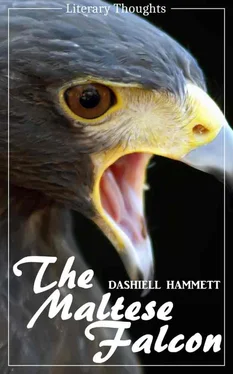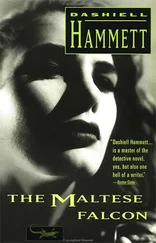“Must they know about me at all?” she asked. “I think I’d rather die than that, Mr. Spade. I can’t explain now, but can’t you somehow manage so that you can shield me from them, so I won’t have to answer their questions? I don’t think I could stand being questioned now. I think I would rather die. Can’t you, Mr. Spade?”
“Maybe,” he said, “but I’ll have to know what it’s all about.”
She went down on her knees at his knees. She held her face up to him. Her face was wan, taut, and fearful over tight-clasped hands.
“I haven’t lived a good life,” she cried. “I’ve been bad—worse than you could know—but I’m not all bad. Look at me, Mr. Spade. You know I’m not all bad, don’t you? You can see that, can’t you? Then can’t you trust me a little? Oh, I’m so alone and afraid, and I’ve got nobody to help me if you won’t help me. I know I’ve no right to ask you to trust me if I won’t trust you. I do trust you, but I can’t tell you. I can’t tell you now. Later I will, when I can. I’m afraid, Mr. Spade. I’m afraid of trusting you. I don’t mean that. I do trust you, but—I trusted Floyd and—I’ve nobody else, nobody else, Mr. Spade. You can help me. You’ve said you can help me. If I hadn’t believed you could save me I would have run away today instead of sending for you. If I thought anybody else could save me would I be down on my knees like this? I know this isn’t fair of me. But be generous, Mr. Spade, don’t ask me to be fair. You’re strong, you’re resourceful, you’re brave. You can spare me some of that strength and resourcefulness and courage, surely. Help me, Mr. Spade. Help me because I need help so badly, and because if you don’t where will I find anyone who can, no matter how willing? Help me. I’ve no right to ask you to help me blindly, but I do ask you. Be generous, Mr. Spade. You can help me. Help me.”
Spade, who had held his breath through much of this speech, now emptied his lungs with a long sighing exhalation between pursed lips and said: “You won’t need much of anybody’s help. You’re good. You’re very good. It’s chiefly your eyes, I think, and that throb you get into your voice when you say things like ‘Be generous, Mr. Spade.’ ”
She jumped up on her feet. Her face crimsoned painfully, but she held her head erect and she looked Spade straight in the eyes.
“I deserve that,” she said. “I deserve it, but—oh!—I did want your help so much. I do want it, and need it, so much. And the lie was in the way I said it, and not at all in what I said.” She turned away, no longer holding herself erect. “It is my own fault that you can’t believe me now.”
Spade’s face reddened and he looked down at the floor, muttering: “Now you are dangerous.”
Brigid O’Shaughnessy went to the table and picked up his hat. She came back and stood in front of him holding the hat, not offering it to him, but holding it for him to take if he wished. Her face was white and thin.
Spade looked at his hat and asked: “What happened last night?”
“Floyd came to the hotel at nine o’clock, and we went out for a walk. I suggested that so Mr. Archer could see him. We stopped at a restaurant in Geary Street, I think it was, for supper and to dance, and came back to the hotel at about half-past twelve. Floyd left me at the door and I stood inside and watched Mr. Archer follow him down the street, on the other side.”
“Down? You mean towards Market Street?”
“Yes.”
“Do you know what they’d be doing in the neighborhood of Bush and Stockton, where Archer was shot?”
“Isn’t that near where Floyd lived?”
“No. It would be nearly a dozen blocks out of his way if he was going from your hotel to his. Well, what did you do after they had gone?”
“I went to bed. And this morning when I went out for breakfast I saw the headlines in the papers and read about—you know. Then I went up to Union Square, where I had seen automobiles for hire, and got one and went to the hotel for my luggage. After I found my room had been searched yesterday I knew I would have to move, and I had found this place yesterday afternoon. So I came up here and then telephoned your office.”
“Your room at the St. Mark was searched?” he asked.
“Yes, while I was at your office.” She bit her lip. “I didn’t mean to tell you that.”
“That means I’m not supposed to question you about it?”
She nodded shyly.
He frowned.
She moved his hat a little in her hands.
He laughed impatiently and said: “Stop waving the hat in my face. Haven’t I offered to do what I can?”
She smiled contritely, returned the hat to the table, and sat beside him on the settee again.
He said: “I’ve got nothing against trusting you blindly except that I won’t be able to do you much good if I haven’t some idea of what it’s all about. For instance, I’ve got to have some sort of a line on your Floyd Thursby.”
“I met him in the Orient.” She spoke slowly, looking down at a pointed finger tracing eights on the settee between them. “We came here from Hongkong last week. He was—he had promised to help me. He took advantage of my helplessness and dependence on him to betray me.”
“Betray you how?”
She shook her head and said nothing.
Spade, frowning with impatience, asked: “Why did you want him shadowed?”
“I wanted to learn how far he had gone. He wouldn’t even let me know where he was staying. I wanted to find out what he was doing, whom he was meeting, things like that.”
“Did he kill Archer?”
She looked up at him, surprised. “Yes, certainly,” she said.
“He had a Luger in a shoulder-holster. Archer wasn’t shot with a Luger.”
“He had a revolver in his overcoat-pocket,” she said.
“You saw it?”
“Oh, I’ve seen it often. I know he always carries one there. I didn’t see it last night, but I know he never wears an overcoat without it.”
“Why all the guns?”
“He lived by them. There was a story in Hongkong that he had come out there, to the Orient, as bodyguard to a gambler who had had to leave the States, and that the gambler had since disappeared. They said Floyd knew about his disappearing. I don’t know. I do know that he always went heavily armed and that he never went to sleep without covering the floor around his bed with crumpled newspaper so nobody could come silently into his room.”
“You picked a nice sort of playmate.”
“Only that sort could have helped me,” she said simply, “if he had been loyal.”
“Yes, if.” Spade pinched his lower lip between finger and thumb and looked gloomily at her. The vertical creases over his nose deepened, drawing his brows together. “How bad a hole are you actually in?”
“As bad,” she said, “as could be.”
“Physical danger?”
“I’m not heroic. I don’t think there’s anything worse than death.”
“Then it’s that?”
“It’s that as surely as we’re sitting here”—she shivered—“unless you help me.”
He took his fingers away from his mouth and ran them through his hair. “I’m not Christ,” he said irritably. “I can’t work miracles out of thin air.” He looked at his watch. “The day’s going and you’re giving me nothing to work with. Who killed Thursby?”
She put a crumpled handkerchief to her mouth and said, “I don’t know,” through it.
“Your enemies or his?”
“I don’t know. His, I hope, but I’m afraid—I don’t know.”
“How was he supposed to be helping you? Why did you bring him here from Hongkong?”
She looked at him with frightened eyes and shook her head in silence. Her face was haggard and pitifully stubborn.
Читать дальше












